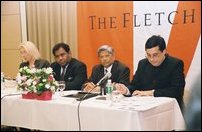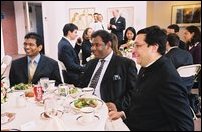Course correction by International Community urged
[TamilNet, Thursday, 06 April 2006, 22:51 GMT]
Blaming the International Community for aiding a State that failed to adopt a political formula embodying shared sovereignty, and which demonstrated its incapacity to persecute a successful war against LTTE, Gajendrakumar Ponnambalam, Tamil National Alliance (TNA) parliamentarian, in a paper presented at a symposium in Tufts University, Fletcher School of Law and Diplomacy, USA, Thursday, said, the International Community should make clear to the Sri Lankan State that "its commitment to territorial integrity is conditional on the Tamil Nation’s legitimate aspirations being met."
Sri Lanka's Ambassador to the United States, Mr Bernard Gunatilleke was the other speaker at the symposium titled “Negotiation with Armed Groups: Sri Lanka and Beyond” sponsored by the The Asia Club at Tufts.

Gajendrakumar Ponnambalam
Tracing the key events during the last four years after the CeaseFire Agreement (CFA) was signed between the Government of Sri Lanka and the Liberation Tigers in February 2002, Gajendrakumar said, the GOSL had failed to comply with the most fundamental provision of the CFA, i.e., to bring normalcy to NorthEast.
Citing the failure of Subcommittees established under the CFA, sidelining the Interim Self-Governing Authority (ISGA) proposal submitted by the LTTE, derailing the P-TOMS (Post tsunami Operational Management Structure), and rejecting the concept of Tamil Homeland and Self-determination rights of Tamils as manifestation of "Sinhala Majoritarian Hegemonism," he said, "if there was a perception of forward movement in the initial stages of the peace process it was in fact due to the LTTE’s compromises."
Blaming the International Community for its pro-State approach he said, "the tragic irony is that the more the southern political dynamics turned hostile to the peace process, the greater the pressure that was brought to bear on the LTTE. It was precisely this flawed approach of the international community, which refuses to identify the greatest stumbling block to reaching a settlement – which is Sinhala majoritarian hegemonism – that was sought to be exposed by the Tamil boycott of the last Presidential Elections. There was an urgent need to get the world to focus on where the problem really lies, and to initiate a rapid course correction to deal with this problem if the peace process was to be saved."
He added that there was still a window of opportunity for the International Community to make a difference in Sri Lanka and that would require an urgent course correction in the approach. This includes, identifying Sinhala majoritarian hegemonism as the stumbling block to finding a solution to the ethnic conflict, recognizing the LTTE as a National Liberation movement, and making the Sri Lanka State understand that "the international community’s commitment to its territorial integrity is conditional on the Tamil Nation’s legitimate aspirations being met."
External Links:













